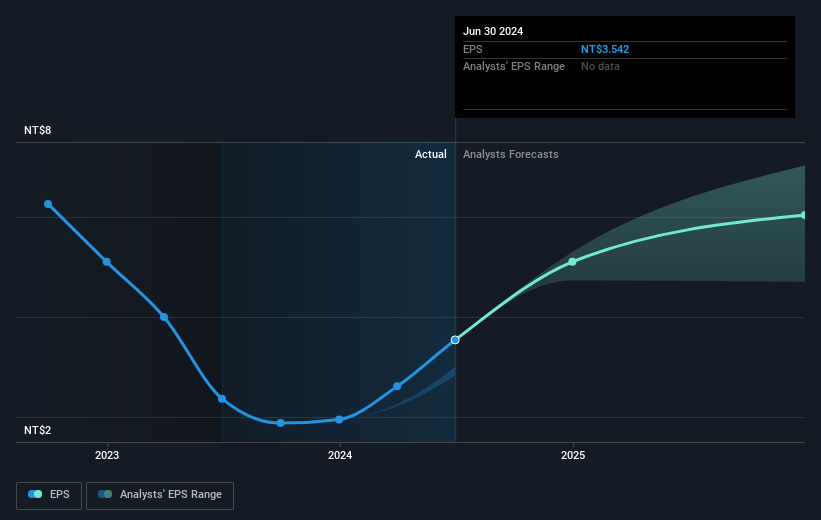Taiwan Paiho's (TWSE:9938) 50% YoY earnings expansion surpassed the shareholder returns over the past year

There's no doubt that investing in the stock market is a truly brilliant way to build wealth. But if when you choose to buy stocks, some of them will be below average performers. Over the last year the Taiwan Paiho Limited (TWSE:9938) share price is up 33%, but that's less than the broader market return. Zooming out, the stock is actually down 1.1% in the last three years.
After a strong gain in the past week, it's worth seeing if longer term returns have been driven by improving fundamentals.
View our latest analysis for Taiwan Paiho
While the efficient markets hypothesis continues to be taught by some, it has been proven that markets are over-reactive dynamic systems, and investors are not always rational. One flawed but reasonable way to assess how sentiment around a company has changed is to compare the earnings per share (EPS) with the share price.
Taiwan Paiho was able to grow EPS by 50% in the last twelve months. This EPS growth is significantly higher than the 33% increase in the share price. Therefore, it seems the market isn't as excited about Taiwan Paiho as it was before. This could be an opportunity.
The graphic below depicts how EPS has changed over time (unveil the exact values by clicking on the image).

We know that Taiwan Paiho has improved its bottom line lately, but is it going to grow revenue? If you're interested, you could check this free report showing consensus revenue forecasts.
What About Dividends?
When looking at investment returns, it is important to consider the difference between total shareholder return (TSR) and share price return. The TSR incorporates the value of any spin-offs or discounted capital raisings, along with any dividends, based on the assumption that the dividends are reinvested. It's fair to say that the TSR gives a more complete picture for stocks that pay a dividend. In the case of Taiwan Paiho, it has a TSR of 35% for the last 1 year. That exceeds its share price return that we previously mentioned. And there's no prize for guessing that the dividend payments largely explain the divergence!
A Different Perspective
Taiwan Paiho shareholders are up 35% for the year (even including dividends). Unfortunately this falls short of the market return. On the bright side, that's still a gain, and it's actually better than the average return of 4% over half a decade This suggests the company might be improving over time. I find it very interesting to look at share price over the long term as a proxy for business performance. But to truly gain insight, we need to consider other information, too. Even so, be aware that Taiwan Paiho is showing 1 warning sign in our investment analysis , you should know about...
If you would prefer to check out another company -- one with potentially superior financials -- then do not miss this free list of companies that have proven they can grow earnings.
Please note, the market returns quoted in this article reflect the market weighted average returns of stocks that currently trade on Taiwanese exchanges.
Valuation is complex, but we're here to simplify it.
Discover if Taiwan Paiho might be undervalued or overvalued with our detailed analysis, featuring fair value estimates, potential risks, dividends, insider trades, and its financial condition.
Access Free AnalysisHave feedback on this article? Concerned about the content? Get in touch with us directly. Alternatively, email editorial-team (at) simplywallst.com.
This article by Simply Wall St is general in nature. We provide commentary based on historical data and analyst forecasts only using an unbiased methodology and our articles are not intended to be financial advice. It does not constitute a recommendation to buy or sell any stock, and does not take account of your objectives, or your financial situation. We aim to bring you long-term focused analysis driven by fundamental data. Note that our analysis may not factor in the latest price-sensitive company announcements or qualitative material. Simply Wall St has no position in any stocks mentioned.
About TWSE:9938
Taiwan Paiho
Manufactures and sells touch fasteners, digital woven fabrics, 4-way stretch fabrics, webbings, elastic, shoelaces, reflective materials, 2D/3D logo, material processing, molded hooks, and bamboo charcoal products in Taiwan and internationally.
Very undervalued with excellent balance sheet.
Market Insights
Community Narratives





